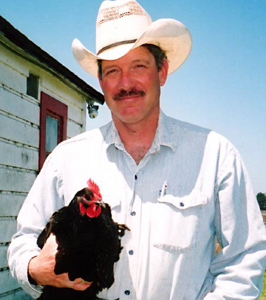![[Metroactive Movies]](/gifs/movies468.gif)
[ Movies Index | Show Times | North Bay | Metroactive Home | Archives ]
Death and Texas
Singing cowboy Scott Gerber remembers 'The Alamo'
By
Scott Gerber is a full-time, real-life singing cowboy. The colorful focus of Bonnie Burt and Judith Montel's recent short documentary Song of a Jewish Cowboy, the 45-year-old Gerber alternates between wrangling cows in Sonoma County and singing old cowboy tunes and Yiddish folk songs all around the country. He's also something of a philosopher. Being a modern cowpuncher, he's also seen a lot of Westerns and nearly every movie ever made about the Alamo.
"I don't why I've seen so many of those movies," the soft-spoken Gerber allows. That list now includes The Alamo, the new big-budget revisionist epic starring Dennis Quaid as Sam Houston, Jason Patric as Jim Bowie and Billy Bob Thornton as a fiddle-playing David Crockett (seems he preferred "David" to the more popular "Davy").
As we exit the theater, Gerber says that he once came within spittin' range of the actual Alamo in San Antonio, Texas, the spot where Crockett and company gave their lives in 1836 in an independence battle against the armies of Mexican dictator Antonio Lopez de Santa Anna, who preferred to keep Texas as a part of Mexico.
"I was working for the National School Assemblies Agency," Gerber says, "and I went out and played concerts for schools, mainly in Arizona and New Mexico. Then I went and played in South Texas. I remember I was heading into San Antonio--I was playing in a school near there--and one of the ladies who was working at the school said to me, 'It's great you're heading into San Antonio, you can check out the Alamo.' I probably shouldn't have said it, but I said, 'Well, I'm not that big a fan of the Alamo. We did steal that land from the Mexicans.' So that was pretty much the end of our conversation. She didn't like that too much, I guess. I never did visit the Alamo."
The Alamo, Gerber believes, is symbolic of all that is unfair about war. "The ones who have the least to gain are always asked to pay the highest price," he says. "It's the common people who die. As we say in cowboy lingo, they're the ones always suckin' the hind teat."
There are potent similarities, he says, between the events depicted in The Alamo and the current political situation with Iraq. In the film, Gen. Sam Houston more or less sacrifices the besieged soldiers at the Alamo, letting the famous fort fall because it gives him both time to build a larger army and better leverage to win Texas away from Santa Anna. Despite this, he coins the famous phrase "Remember the Alamo!" to rile up his troops in their assault against Santa Anna's army at San Jacinto.
"'Remember 9-11!'" Gerber says. "Isn't that different from 'Remember the Alamo.' That's why were in Iraq, 'cause Bush keeps yelling, 'Remember 9-11!' It's the same story all over again with different actors. That's the way it seems to me. New people, new landscape, but the same old greed and--I seem to keep on saying this--it's the same common folk who gets the brunt of it, on all sides."
Early in the film, Col. William Barret Travis (Patrick Wilson) tells his young son, "One crowded hour of glory is worth an age without a name." I ask Gerber what he thinks of that advice.
"What is glory? Was that glory?" he snorts. "I mean, the guys at the Alamo were brave and they fought good and hard, but so what? Was that glorious? It seems to me that they bravely gave their lives for a useless cause. I don't see how that was heroic."
"So how would you define the word 'hero'?" I ask.
"I don't know, but I don't think it always has to do with battle," Gerber replies.
In The Alamo, David Crockett has one great moment, where he climbs on top of the fortress wall to play his fiddle across the field at the awestruck Mexican army.
"That was heroic," says Gerber with a smile. "And if it wasn't actually true, it should have been."
[ North Bay | Metroactive Central | Archives ]
Copyright © Metro Publishing Inc. Maintained by Boulevards New Media.
![]()

Local Attraction: Petaluma's own singing cowboy, Scott Gerber.
In its ongoing quest for the ultimate postfilm conversation, Talking Pictures takes interesting people to interesting movies.
From the April 21-27, 2004 issue of the North Bay Bohemian.